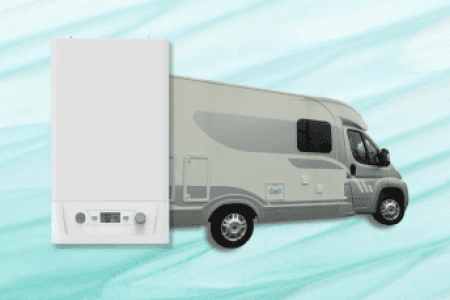A lot of people ask me whether gas or electric is best for an RV water heater.
In my opinion, the best water heater option for most RV owners is a hybrid water heater that can use either propane gas, electricity, or both.
These water heaters can provide fast hot water when tethered to a campground, or camping remotely. Hybrid water heaters provide fast hot water by switching from electricity to gas and back again, depending on the available power source. This makes hybrid water heaters cost effective and convenient.
But if you want to go either gas or electric, then read on and I’ll explain the pros and cons of each.
Is Gas Better Than Electric for My RV Water Heater?
Not necessarily. Both propane gas and electricity have a place among RV owners.
For example, electric water heaters are very convenient when connected to a campground’s electricity, also known as shore power. This not only powers very useful amenities like heat and air conditioning, but provides plentiful hot water.
However, electric water heaters can take up to an hour to heat 6 -10 gallons of water, which can get used up very quickly. A family camping trip can go through some serious hot water, so in these situations, a propane gas water heater is preferable.
Propane gas water heaters have the advantage of producing heat much more quickly than electricity. These water heaters literally heat the water using a flame, so they get very hot, very quickly. This can be especially useful when the RV is in a remote location.
Most RV owners admit that creature comforts like warm showers in the morning can make the difference between a great trip and an uncomfortable one.
What is the Difference Between a Propane Water Heater and an Electric Water Heater?
Recreational vehicles have long used propane gas to power everything from camp stoves to televisions. The nature of RVs requires that built-in appliances such as stoves, heaters, and water heaters have the capability of operating without electricity.
As such, propane gas is often considered a lifeline to RV owners even when electricity is available. This is often because most camping facilities only provide 30 amp electrical service at the campsite. Larger RVs often have amenities like air conditioners that draw nearly all the available “shore power” upon start up. This is often a problem, because when another appliance, like a water heater, is also running the circuit can overload. If this occurs, either a fuse or circuit breaker will trip, shutting off the power.
- 𝟭.𝟱𝟴𝗚𝗣𝗠/𝟲𝗟 𝗣𝗿𝗼𝗽𝗮𝗻𝗲...
- 𝗚𝗼𝗼𝗱 𝗳𝗼𝗿 𝗢𝗳𝗳-𝘁𝗵𝗲-𝗚𝗿𝗶𝗱 -...
- 𝗔𝗱𝘃𝗮𝗻𝗰𝗲𝗱 𝗦𝗮𝘁𝗲𝗳𝘆...
- 𝗟𝗘𝗗 𝗗𝗶𝗴𝗶𝘁𝗮𝗹 𝗗𝗶𝘀𝗽𝗹𝗮𝘆 -...
- 𝟭-𝗬𝗲𝗮𝗿 𝗖𝘂𝘀𝘁𝗼𝗺𝗲𝗿...
Propane gas water heaters use a pilot light, which is a small open flame that ignites a burner under the water heater. This is in contrast to an electric water heater, which uses anodes (a very thick wire) inside the water heater to heat the water. Both versions have their advantages and disadvantages.
In recent years, manufacturers have tried to help alleviate these issues by getting creative. Since it is not a good idea to leave propane gas on while the RV is moving, often the water in the water heater will be cooled by the time the RV reaches its destination.
To resolve this, new technology has emerged that uses the RV’s engine heat to keep the water relatively warm. This results in much faster hot water when the RV stops and returns to shore power.
How Can I Improve the Performance of My RV Water Heater?
The best way to extend the life of an RV water heater is regular maintenance.
RVs tend to sit idle for long periods, so most RV owners are used to the standard chores. These often include winterizing, annual inspections, and so on. Specific to water heaters, RV owners often have a checklist they go through each season. This checklist can include:
Flushing the Tank
This is especially important at the end of the season, as corrosion usually occurs while the system is sitting idle. Depending on the water source, many times shore water will be very hard water. Lime deposits and other minerals can build up in the tank and particularly the lines, which can cause very inconvenient failures.
Therefore, regular system flushing is usually recommended every six months, whether the RV has been used or not.
Keep the Tank Full of Water
Many RV owners have learned to keep the RVs electric water heater tank full when the RV is moving. This is often due to the issue of connecting to shore power.
When campers arrive at a campsite, often the first task is connecting to the 30 amp power supply. This automatically turns on the appliances inside the camper (that have no on/off switch), such as the water heater.
As mentioned earlier, in these electric water heaters, a large wire called an anode heats up to several hundred degrees. In normal operation, this heats the water surrounding the anode, producing hot water. However, if the tank is empty the anode cannot dissipate the heat and will usually burn out, leaving the RV without hot water.
Replace the Anodes Annually
In contrast to residential homes, it is recommended to RV owners to replace the water heater anodes annually.
In a residential electric water heater, these anodes can last for years. In RVs however, if these anodes can fail due to corrosion leaving the campers inconveniently without hot water. Therefore, it is recommended to replace these anodes annually to ensure the RV has hot water when it’s needed.
FAQ RV Water Heaters
Should I Leave My RV Propane Water Heater on All the Time?
It is not recommended to leave a propane powered water heater on all the time, especially when the RV is moving. This is because the gas lines are usually made from flexible materials such as rubber, which can dry rot and leak over time. While the RV is moving, these brittle lines can rupture and cause a dangerous propane gas leak. It is therefore recommended to switch off the propane while the RV is in motion.
Electric water heaters do not have this weakness.
Electric water heaters, unlike propane water heaters, are considered completely safe to operate while the RV is moving or stationary. However, the water heater should remain full of water.
Will Leaving My RV Water Heater on All the Time Be Expensive?
Any power consumption, whether gas or electricity will result in costs. However, RV owners tend to want to be comfortable, so many consider the additional expense worth the creature comfort it provides.
However, for those looking to camp on a budget, turning off the water heater anytime it is not in use will result in cost savings.
Will Leaving My RV Hot Water Heater on Wear It Out?
Although any gas or electrical component will eventually wear out the more it is used it is not typically considered a concern. This is because propane gas water heaters really have no moving parts, which tend to wear out first. These water heaters depend on a pilot light to ignite the burners under the tank, so parts tend to last a while.
Electric water heaters however, will suffer considerably more wear due to the constant heating and cooling of the anodes. This is why it was recommended earlier to replace the anodes annually.
Wrapping Up
Having a reliable water heater, whether it is gas or electric, is one of the better decisions you can make for your RV. In addition to installing a water softener for your RV, which is super easy, having the best water heater will ensure you will reliably have hot water when you need it.

Nick Lopresti is the founder of YourH2Home and a home improvement expert. He has years of experience writing about various home improvement topics, mostly as it pertains to water systems.

